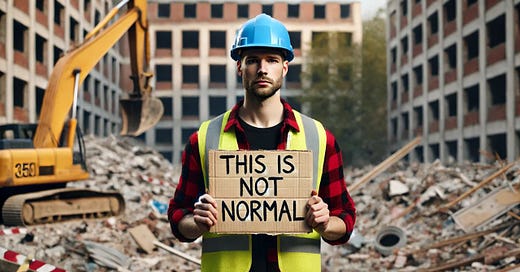This is NOT normal
The UK demolition industry has become desensitised; numb to its own failures and shortcomings. It has normalised the abnormal.
At the height of the COVID-19 crisis, a new phrase crept into the English language.
The wearing of face masks, social distancing and checking the TV each night to find out how many of our fellow countrymen had died that day was, we were told, “the new normal”…even though there was nothing even remotely normal about any of t.
This is what normalisation looks like. Ideas, behaviours, or conditions that once felt unacceptable or dangerous gradually come to be seen as routine, normal, or no longer worth questioning.
And that normalisation is not exclusive to pandemics, politics and TV news reports. It is very much alive and unwell in the demolition and construction sector too.
You stand on a demolition or construction site in Britain. And what's become routine here is nothing short of shocking.
Fifty-one of your colleagues died in accidents last year. Fifty-one of our brothers and sisters gone forever. One death roughly every week, right here on sites that should feel secure; sites that are supposed to be protected by systems and training developed over the course of decades. Yet somehow, that’s what we’ve come to expect. This is not normal.
But accidents aren’t the only killers lurking among us. Every year, more than 5,000 people die from asbestos-related diseases. Two thousand two hundred and fifty-seven deaths from mesothelioma alone in 2022, and nearly as many from lung cancer and asbestosis. Asbestos doesn’t announce itself. It kills silently, slowly. Decade after decade. We’re still working among it. Still dying from it. This is not normal.
More than 4,000 construction firms collapsed across the UK last year. Thousands of jobs lost, supply chains broken, work abandoned. You’d expect those collapses to shock us. But they barely register. Just as soon as another company goes pop - which they inevitably will - we shrug and move on. This is not normal.
Normalisation is not exclusive to pandemics and TV news reports. It is very much alive and unwell in the demolition and construction sector too.
Less than 15 percent of workers are women. Ours is a workforce built on exclusion and tradition, not talent or fairness. We all know the stories: the job site where she didn’t fit; where she had to prove herself repeatedly just to stand her ground; the site where she was harassed to breaking point. Yet we treat that as business as usual. This is not normal.
And what about job security? One day you're on payroll, the next you're "off‑hired" with no warning, no fallback, no pay. No decent notice, no mental health safety net, no dignity. And again we shrug. This is not normal.
And then there are the blink‑and‑you‑miss‑it sinkholes of budget and time. Every project is delayed, every bill inflated. Our promises begin to look like fiction. We accept overruns as the norm. We don’t even flinch anymore. This is not normal.
Instances of corruption and collusion make the headlines on a regular basis. Brown envelopes being traded to secure demolition and construction projects; backhanders being exchanged to ensure that certain labour supply companies are the go-to for a specific project. It’s nothing new and it certainly doesn’t come as any surprise when it is uncovered. But this too is not normal.
There’s another lie we’re living; not admitting that the despair here goes deeper still. The suicide rate among demolition and construction workers is almost four times the national average. That’s nearly two of your colleagues taking their own life every single week. This is not normal.
So here we are: normalising death, disease, failure, inequality, insecurity, inefficiency, and despair. Layer upon layer of disaster we’ve accepted as everyday life. We look at this list, and we say, “That’s how things are.” Well, guess what? This is NOT how things should be. This is not normal.
When you clock in today, when you walk that site, remember the reality beneath the noise. The bodies. The broken hearts. The families who never see Sunday again. The invisible killers. The companies that vanish. The exclusions. The desperation. The broken promises.
It’s not normal. When a worker dies falling from height and we barely blink, we have lost the plot. We have lost the meaning of the word normal. When a disease takes lives decades later and we carry on, something’s gone wrong. When businesses crumble and families are scattered, we pretend it's just the economy. But it’s not. When women remain on the margins, uncounted, undervalued, this is not normal.
Every time a budget balloons, every time a deadline drifts, we rationalise it as part of the game. We may have come to accept it. But this is not normal.
This is not normal. Or it shouldn’t be. Not in this day and age. Not in our lifetimes. Not on our watch. Not while we’re here.
Normal is what we make it; not what we’re told it is. Accepting anything else merely compounds the tragedy.





